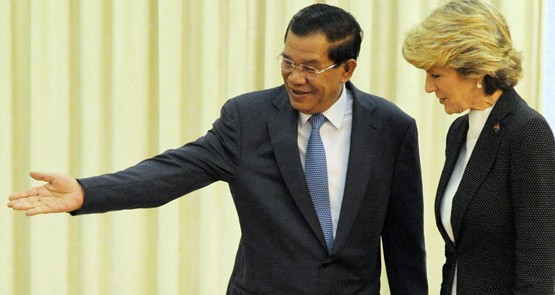
After an anti-colonial war, revolution, a genocidal regime and then a civil war, it was hoped that the United Nations intervention in Cambodia a quarter of a century ago would result in a stable multi-party democracy. In recent days, however, Cambodia’s long slide back towards naked dictatorship has become all but complete.
Last weekend, Cambodia’s opposition leader, Kem Sokha, was arrested on a spurious charge of “treason”. No evidence has been presented in support of his arrest, although the growing popularity of the Cambodia National Rescue Party (CNRP), of which he is head, is the fairly obvious incentive.
Cambodia is due to go to elections next July and, assuming the elections went ahead, it has been widely anticipated that the CNRP would defeat Prime Minister Hun Sen’s Cambodian People Party (CPP). Indeed, it was believed that the CNRP had actually defeated the CPP in the country’s 2012 elections, but that the results were manipulated to show a CPP victory.
With a new vote counting system, it will be very much more difficult to rig the election outcome. To that end, Cambodian civil society groups have been calling on international election observers to monitor the elections to help ensure its outcome would be respected.
[Cambodia refugee deal costs soar, with moral price immeasurable]
The prevailing concern among election observers has been that the CPP would engineer a crisis and then cancel the elections, that the elections would be held but that the losing CPP would impose a joint governing process with the CNRP in a manner similar to that imposed of the winning party in 1992, or that the CPP would simply stage a coup against the elected government. The arrest of Kem Sokha, however, has pre-empted those concerns.
Along with the arrest of Kem has been the closure of Cambodia’s English language newspaper, the vocally independent Cambodia Daily, and the closure of 19 radio stations, the primary means of rural Cambodians for getting news and information. Hun Sen is now threatening to ban the CNRP from contesting the elections if it does not disavow Kem’s leadership.
A CPP spokesman has said that, given Kem is charged with treason, he must be replaced as CNRP leader. The CNRP has insisted that it will not replace Kem as its leader, leading to a showdown with the government, with the government spokesman saying if the CNRP does not “comply with the law, they will have no right to political activity”. That is, it will not be allowed to contest the 2018 elections.
Elections could, in this case, still take place, with a small number of CPP puppet parties helping to maintain Cambodia’s increasingly thin veneer of “democracy”. The outcome of the elections is not in doubt, however, given that Hun Sen has just reaffirmed that he intends to rule for another 10 years. This is on top of the 32 years Hun Sen has already had as Cambodia’s ruler, already making him the longest-standing leader in Asia.
[Our new refugee ‘dumping ground’: what Cambodia thinks of the request]
No other opposition to Hun Sen is likely. Between Hun Sen and his three sons, he closely runs the army and key Cambodian businesses. He is supported in this by powerful, and corrupt, CPP allies who have enriched themselves under his rule.
Some Cambodia observers have claimed that Cambodia has been a functional dictatorship since 1997, when the CPP launched a coup against its then governing “partner”, the royalist FUNCINPEC. The claim is that Hun Sun has simply calibrated the extent of his absolute control to appease the United States and other Western countries, with which Cambodia has favorable trading relations.
The more critical of Cambodia observers, including those who helped arrange the end of the country’s civil war and its post-war UN-supervised elections, have long argued that the UN was simply duped into taming the then deposed but still warring Khmer Rouge and the royalist and nationalist factions, handing Hun Sen a united Cambodia over which he has effectively held total power. Events since 1997 have proven correct the most cynical of these analysts.
Recent events have effectively stripping away Cambodia’s last remaining semblance of multi-party politics. Its slide towards dictatorship is now all but complete.
*Damien Kingsbury is Deakin University’s Professor of International Politics, and accredited observer to 10 sets of elections in south-east Asia








Considering all the dumb, venal, outrageous and downright contemptible things the current Australian government has done, can there be one more toxic, wicked and unarguably evil than the $50M sale of four men found and certified to be refugees?
Surely that will go in the History of Ignominy?
Thanks Damien, wow, another south east asian country going down a path that makes this region more uncomfortable.
Is there any part of the world looking up, or is the only positive we can find out of all this the possible death of the neoliberal experiment.
Wow, how bad are things at the moment?